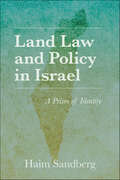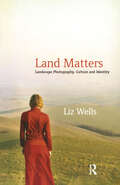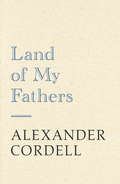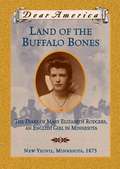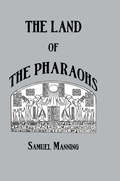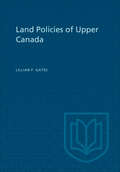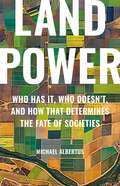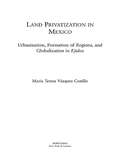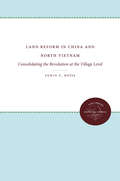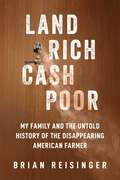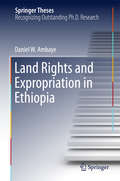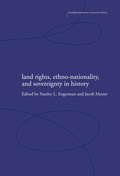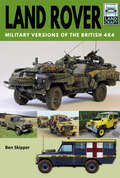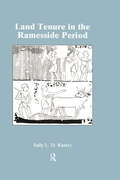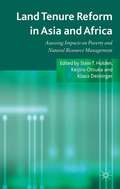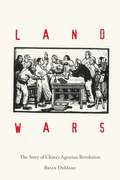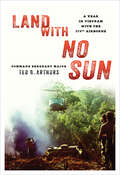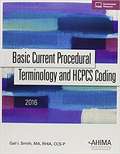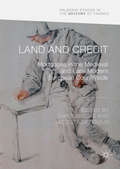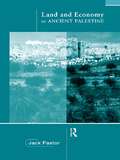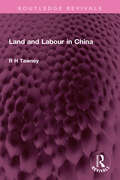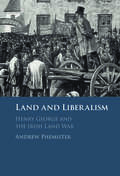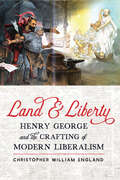- Table View
- List View
Land Law and Policy in Israel: A Prism of Identity (Perspectives on Israel Studies)
by Haim SandbergAs one of the smallest and most densely populated countries in the world, the State of Israel faces serious land policy challenges and has a national identity laced with enormous internal contradictions. In Land Law and Policy in Israel,Haim Sandberg contends that if you really want to know the identity of a state, learn its land law and land policies.Sandberg argues that Israel's identity can best be understood by deciphering the code that lies in the Hebrew secret of Israeli dry land law. According to Sandberg, by examining the complex facets of property law and land policy, one finds a unique prism for comprehending Israel's most pronounced identity problems.Land Law and Policy in Israel explores how Israel's modern land system tries to bridge the gaps between past heritage and present needs, nationalization and privatization, bureaucracy and innovation, Jewish majority and non-Jewish minority, legislative creativity and judicial activism. The regulation of property and the determination of land usage have been the consequences of explicit choices made in the context of competing and evolving concepts of national identity. Land Law and Policy in Israel will prove to be a must-read not only for anyone interested in Israel but also for anyone who wants to understand the importance of land law in a nation's life.
Land Matters: Landscape Photography, Culture and Identity (International Library Of Cultural Studies)
by Liz WellsIn this major work on landscape photography, extensively illustrated in colour and black & white, Liz Wells is concerned with the ways in which photographers engage with issues about land, its representation and idealisation. She demonstrates how the visual interpretation of land as landscape reflects and reinforces contemporary political, social and environmental attitudes. She also asks what is at stake in landscape photography now through placing critical appraisal of key examples of work by photographers working in, for example, the USA, in Europe, Scandinavia and Baltic areas, within broader art historical and political concerns. This illuminating book will interest readers in photography and media, geography, art history and travel, as well as those concerned with environmental issues.
Land Of My Fathers
by Alexander CordellSet against the background of the Chartist rebellion, LAND OF MY FATHERS is a heartfelt evocation of the greatest iron town in the world, Merthyr, and of the people who made it so: foundry-owners and workers, immigrants, fortune-hunters, idealists, prostitutes and wastrels. It is also the story of one man, Taliesin Roberts, robust, determined, passionate - and of a three-sided love that will never die.
Land Of My Fathers
by Alexander CordellSet against the background of the Chartist rebellion, LAND OF MY FATHERS is a heartfelt evocation of the greatest iron town in the world, Merthyr, and of the people who made it so: foundry-owners and workers, immigrants, fortune-hunters, idealists, prostitutes and wastrels. It is also the story of one man, Taliesin Roberts, robust, determined, passionate - and of a three-sided love that will never die.
Land Of The Buffalo Bones: The Diary Of Mary Elizabeth Rodgers, An English Girl In Minnesota, New Yeovile, Minnesota 1873 (Dear America Ser.)
by Marion BauerThe diary of Mary Rodgers, known as Polly, details her family's experiences in their journey from England to the Minnesota prairie, where her father hopes to find religious freedom and fertile land.
Land Of The Pharaohs: Drawn With Pen And Pencil
by ManningFirst published in 2005. Routledge is an imprint of Taylor & Francis, an informa company.
Land Policies of Upper Canada
by Lillian F. GatesFrom 1763 to 1867 the land system of Upper Canada was one of the most important questions in the development of the new country. This detailed study of the subject examines Great Britain's plans for Canada after the conquest, the problems created by the royal "promise" of land to the loyalists, Lord Durham's Report, and the failure of the land policies to reach their economic and political objectives. In addition it covers the land problems in Canada after responsible government was achieved: Clergy Reserves, untenanted and abandoned land, settlement duties, speculation, wild land tax and assessment, and the activities of squatters. Based on Colonial Office depsatches, legislative records, the Crown Land Papers, newspapers and various private collections of documents, this work offers an accurate account of the social, economic and political aspects related to land policy in nineteenth-century Upper Canada.
Land Power: Who Has It, Who Doesn't, and How That Determines the Fate of Societies
by Michael AlbertusAn award-winning political scientist shows that a society&’s path to prosperity, sustainability, and equality depends on who owns the land For millennia, land has been a symbol of wealth and privilege. But the true power of land ownership is even greater than we might think. In Land Power, political scientist Michael Albertus shows that who owns the land determines whether a society will be equal or unequal, whether it will develop or decline, and whether it will safeguard or sacrifice its environment. Modern history has been defined by land reallocation on a massive scale. From the 1500s on, European colonial powers and new nation-states shifted indigenous lands into the hands of settlers. The 1900s brought new waves of land appropriation, from Soviet and Maoist collectivization to initiatives turning large estates over to family farmers. The shuffle continues today as governments vie for power and prosperity by choosing who should get land. Drawing on a career&’s worth of original research and on-the-ground fieldwork, Albertus shows that choices about who owns the land have locked in poverty, sexism, racism, and climate crisis—and that what we do with the land today can change our collective fate. Global in scope, Land Power argues that saving civilization must begin with the earth under our feet.
Land Privatization in Mexico: Urbanization, Formation of Regions and Globalization in Ejidos
by Maria Teresa Vázquez-CastilloThis book analyzes [ejido] land as space of urbanization and location of economic activities and capital and land privatization as a redistributive process with local, urban, regional and global consequences.
Land Reform in China and North Vietnam: Consolidating the Revolution at the Village Level
by Edwin E. MoïseThis first book to consider land reform in both countries show that reform, as the Communists have conducted it, can be justified in China and North Vietnam for both economic reasons and ideological imperatives. Moise argues that the violence associated with land reform was as much a function of the social inequities that preceded reform as it was of the reform policy itself and explains the difficulties the Communist leaders encountered in developing a successful program.Originally published in 1983.A UNC Press Enduring Edition -- UNC Press Enduring Editions use the latest in digital technology to make available again books from our distinguished backlist that were previously out of print. These editions are published unaltered from the original, and are presented in affordable paperback formats, bringing readers both historical and cultural value.
Land Rich, Cash Poor: My Family's Hope and the Untold History of the Disappearing American Farmer
by Brian ReisingerThe hidden history of an economic and cultural crisis that is threatening our very food supply—the disappearance of the American farmer. Taking on this working-class story of heart and hardship, award-winning writer Brian Reisinger weaves forgotten eras of American history with his own family&’s four-generation fight for survival in Midwestern farm country. Readers learn the truth about America&’s most detrimental and unexplained socioeconomic crisis: How the family farms that feed us went from cutting a middle-class path through the Great Depression to barely making ends meet in modern America. Along the way, they&’ll see what it truly takes to feed our country: accidents that can kill or maim; weather that blesses or threatens; resilience in the face of crushing economic crises, from depressions and recessions to COVID-19; and the tradition that presses down on each generation when you're not just fighting for your job, you're fighting for your heritage. With newly analyzed data, sharp historical analysis, conversations with some of modern farming&’s most notable champions and critics alike, honest debate, and personal storytelling, Reisinger reveals how the hollowing out of rural America is affecting every single American dinner table. Food prices soaring far beyond the rate of inflation, a vulnerable food supply chain, environmental and ecological dilemmas, the security of our farmland from foreign adversaries, a mental health crisis that includes farmer suicides and addictions, a deepening urban-rural divide, and more worries than ever about what&’s for dinner. These are all becoming the hallmarks of a food system that has long stood as a modern miracle. Land Rich, Cash Poor offers the honest truth about these issues, and a candid look at what we can do about them—before it&’s too late.
Land Rights and Expropriation in Ethiopia
by Daniel W. AmbayeThis thesis provides a new approach to the Ethiopian Land Law debate. The basic argument made in this thesis is that even if the Ethiopian Constitution provides and guarantees common ownership of land (together with the state) to the people, this right has not been fully realized whether in terms of land accessibility, enjoyability, and payment of fair compensation in the event of expropriation. Expropriation is an inherent power of the state to acquire land for public purpose activities. It is an important development tool in a country such as Ethiopia where expropriation remains the only method to acquire land. Furthermore, the two preconditions of payment of fair compensation and existence of public purpose justifications are not strictly followed in Ethiopia. The state remains the sole beneficiary of the process by capturing the full profit of land value, while paying inadequate compensation to those who cede their land by expropriation. Secondly, the broader public purpose power of the state in expropriating the land for unlimited activities puts the property owners under imminent risk of expropriation.
Land Rights, Ethno-nationality and Sovereignty in History (Routledge Explorations in Economic History)
by Stanley L. Engerman Jacob MetzerThe complex relationships between ethno-nationality, rights to land, and territorial sovereignty have long fed disputes over territorial control and landed rights between different nations, ethnicities, and religions. These disputes raise a number of interesting issues related to the nature of land regimes and to their economic and political implications. The studies drawn together in this key volume explore these and related issues for a broad variety of countries and times. They illuminate the diverse causes of ethno-national land disputes, and the different forms of adjustment and accommodation to the power differences between the contesting groups. This is done within a framework outlined by the editors in their analytical overview, which offers contours for comparative examinations of such disputes, past and present. Providing conceptual and factual analyses of comparative nature and wealth of empirical material (both historical and contemporary), this book will appeal to economic historians, economists, political scientists, sociologists, anthropologists and all scholars interested in issues concerning ethno-nationality and land rights in historical perspective.
Land Rights, Ethno-nationality and Sovereignty in History (Routledge Explorations in Economic History)
by Stanley L. Engerman Jacob MetzerThe complex relationships between ethno-nationality, rights to land, and territorial sovereignty have long fed disputes over territorial control and landed rights between different nations, ethnicities, and religions. These disputes raise a number of interesting issues related to the nature of land regimes and to their economic and political implications.The studies drawn together in this key volume explore these and related issues for a broad variety of countries and times. They illuminate the diverse causes of ethno-national land disputes, and the different forms of adjustment and accommodation to the power differences between the contesting groups. This is done within a framework outlined by the editors in their analytical overview, which offers contours for comparative examinations of such disputes, past and present.Providing conceptual and factual analyses of comparative nature and wealth of empirical material (both historical and contemporary), this book will appeal to economic historians, economists, political scientists, sociologists, anthropologists and all scholars interested in issues concerning ethno-nationality and land rights in historical perspective.
Land Rover: Military Versions of the British 4x4 (LandCraft)
by Ben SkipperA richly illustrated guide to modeling the military Land Rover, filled with previously unseen inspirational photographs and drawings.The Land Rover was originally designed to fill a gap in the Rover Car Company’s post-war product portfolio. Initially based on Willy’s-Overlands Jeep, the now-legendary Land Rover was adopted by armed forces across the globe almost immediately. By its sixtieth anniversary in 2008 the Land Rover was serving as a combat vehicle and as a first responder platform.This unique LandCraft title looks into the Land Rover’s development during the immediate post-war years, to its development and growth as a military vehicle synonymous with versatility. The book charts how the Land Rover evolved into unique military-only variants.The book also examines how this modest 4x4 grew from an innocuous Cold War cargo vehicle into a weapons platform supporting troops in the deserts of South West Asia. The military Land Rover truly offers the modeler an exciting range of subject, era and theatre choices.“A welcome addition to the very popular Land Craft Series. Aimed at model makers, this series has become popular with a much wider readership, due to the excellent text describing the subject vehicle and its deployment, including unit structures—Very Highly Recommended.” —Firetrench“All in all this is a great, compact reference work for modelers heading off on a Land Rover safari. It’s not overwhelming, provides good recommendations and fair assessments of products while presenting fantastic reference material to help the modeler get motivated and also providing enough up close detail to be helpful.” —AMPS
Land Tenure In The Ramesside
by Sally L.D. KataryFirst published in 1989. Previous commentators on the Wilbour Papyrus have been daunted by the vast quantity of data presented in its assessment of land tenure in Middle Egypt during the reign of Ramesses V- data which has the potential to shed light upon many facets of economic life in Ramesside Egypt, but which has so far defied any but the broadest of generalisations. For the first time, Sally Katary has approached this important document armed with the techniques of modern statistical analysis, establishing a framework within which the socio-economic data contained in the Papyrus may be retrieved, analysed and evaluated in order to draw inferences concerning the workings of the Egyptian agricultural economy during the Twentieth Dynasty. Her study then relates the data of the Wilbur Papyrus to contemporary and near-contemporary economic and administrative documents in order to give the data an historical context and concludes by outlining future avenues of research and the appropriate methodology with which to pursue them.
Land Tenure Reform in Asia and Africa
by Klaus Deininger Keijiro Otsuka Stein T. HoldenRural poverty remains widespread and persistent in South Asia and Sub-Saharan Africa. A group of leading experts critically examines the impact of land tenure reforms on poverty reduction and natural resource management in countries in Africa and Asia with highly diverse historical contexts.
Land Wars: The Story of China's Agrarian Revolution
by Brian DeMareMao Zedong's land reform campaigns comprise a critical moment in modern Chinese history, and were crucial to the rise of the CCP. In Land Wars, Brian DeMare draws on new archival research to offer an updated and comprehensive history of this attempt to fundamentally transform the countryside. Across this vast terrain loyal Maoists dispersed, intending to categorize poor farmers into prescribed social classes, and instigate a revolution that would redistribute the land. To achieve socialist utopia, the Communists imposed and performed a harsh script of peasant liberation through fierce class struggle. While many accounts of the campaigns give false credence to this narrative, DeMare argues that the reality was much more complex and brutal than is commonly understood—while many villagers prospered, there were families torn apart and countless deaths. Uniquely weaving narrative and historical accounts, DeMare powerfully highlights the often devastating role of fiction in determining history. This corrective retelling ultimately sheds new light on the contemporary legacy of land reform, a legacy fraught with inequality and resentment, but also hope.
Land With No Sun: A Year in Vietnam with the 173rd Airborne
by Commander Ted G ArthursA first-person history of the action seen by the United States airborne infantry brigade in Vietnam, from a Silver Star awarded Command Sergeant Major. A no-holds-barred, straight-in-your-face account of combat in Vietnam. You know it's going to be hot when your brigade is referred to as a Fireball unit. From May 1967 through May 1968, Ted Arthurs was in the thick of it, humping an eighty-pound rucksack through triple canopy jungle, chasing down the Viet Cong and North Vietnamese in the Central Highlands of South Vietnam. As sergeant major for a battalion of eight-hundred men, it was his job to see them through this jungle hell and get them back home again.
Land and Book
by Scott Thompson SmithIn this original and innovative study, Scott T. Smith traces the intersections between land tenure and literature in Anglo-Saxon England. Smith aptly demonstrates that as land became property through the operations of writing, it came to assume a complex range of conceptual values that Anglo-Saxons could use to engage a number of vital cultural concerns beyond just the legal and practical - such as political dominion, salvation, sanctity, status, and social and spiritual obligations.Land and Book places a variety of texts - including charters, dispute records, heroic poetry, homilies, and the Anglo-Saxon Chronicle - in a dynamic conversation with the procedures and documents of land tenure, showing how its social practice led to innovation across written genres in both Latin and Old English. Through this, Smith provides an interdisciplinary synthesis of literary, legal, and historical interests.
Land and Credit: Mortgages In The Medieval And Early Modern European Countryside (Palgrave Studies in the History of Finance)
by Chris Briggs Jaco ZuijderduijnThis volume investigates the use of mortgages in the European countryside between the thirteenth and eighteenth centuries. A mortgage allowed a loan to be secured with land or other property, and the practice has been linked to the transformation of the agrarian economy that paved the way for modern economic growth. Historians have viewed the mortgage both positively and negatively: on the one hand, it provided borrowers with opportunities for investment in agriculture; but equally, it exposed them to the risk of losing their mortgaged property. The case studies presented in this volume reveal the variety of forms that the mortgage took, and show how an intricate balance was struck between the interests of the borrower looking for funds, and those of the lender looking for security. It is argued that the character of mortgage law, and the nature of rights in land in operation in any given the place and period, determined the degree to which mortgages were employed. Over time, developments in these factors allowed increasing numbers of peasants to use mortgages more freely, and with a decreasing risk of expropriation. This volume will be appealing to academics and researchers interested in financial history, rural credit and debt, and the economic history of agrarian communities.
Land and Economy in Ancient Palestine
by Jack PastorLand and Economy in Ancient Palestine is a study of the economic crises throughout the Second Temple Period. It establishes that the single factor of the economy which united all aspects of life in ancient society was land.Through study of a wide variety of sources, including the New Testament and classical authors, Jack Pastor looks at who owned land, and how they came to possess it. He examines the various ramifications of landownership in ancient society to ascertain its effect on livelihoods, government policies and revenues. A special emphasis is placed on debt and famine as social and economic problems with ties to the landholding structure.
Land and Labour in China (Routledge Revivals)
by R H Tawney dec'dFirst published in 1932 Land and Labour in China is an introductory volume dealing with certain aspects of economic life in China. R. H. Tawney discusses important themes ranging from rural framework, problems of the peasant to the growth of capitalist industry in China
Land and Liberalism: Henry George and the Irish Land War
by Andrew PhemisterIrish land in the 1880s was a site of ideological conflict, with resonances for liberal politics far beyond Ireland itself. The Irish Land War, internationalised partly through the influence of Henry George, the American social reformer and political economist, came at a decisive juncture in Anglo-American political thought, and provided many radicals across the North Atlantic with a vision of a more just and morally coherent political economy. Looking at the discourses and practices of these agrarian radicals, alongside developments in liberal political thought, Andrew Phemister shows how they utilised the land question to articulate a natural and universal right to life that highlighted the contradictions between liberty and property. In response to this popular agrarian movement, liberal thinkers discarded many older individualistic assumptions, and their radical democratic implications, in the name of protecting social order, property, and economic progress. Land and Liberalism thus vividly demonstrates the centrality of Henry George and the Irish Land War to the transformation of liberal thought.
Land and Liberty: Henry George and the Crafting of Modern Liberalism (Hagley Library Studies in Business, Technology, and Politics)
by Christopher William EnglandA comprehensive history of Henry George and the single tax movement.In 1912, Sun Yat-sen announced the birth of the Chinese Republic and promised that it would be devoted to the economic welfare of all its people. In shaping his plans for wealth redistribution, he looked to an American now largely forgotten in the United States: Henry George. In Land and Liberty, Christopher William England excavates the lost history of one of America's most influential radicals and explains why so many activists were once inspired by his proposal to tax landed wealth. Drawing on the private papers of a network of devoted believers, Land and Liberty represents the first comprehensive account of this important movement to nationalize land and expropriate rent. Beginning with concerns about rising rents in the 1870s and ending with the establishment of New Deal policies that extended public control over land, natural resources, and housing, "Georgism" served as a catalyst for reforms intended to make the nation more democratic. Many of these concerns remain relevant today, including the exploitation of natural resources, rising urban rent, and wealth inequality. At a time when class divisions sparked fears that capitalism and democracy were incompatible, hopes of building a social welfare state using the rents of idle landlords revitalized the middle class's conviction that democracy and liberty could be reconciled. Against steep odds, George made land nationalization vital to the politics of a nation dominated by small farmers and helped push liberalism leftward through his calls for collective rights to land and natural resources.
